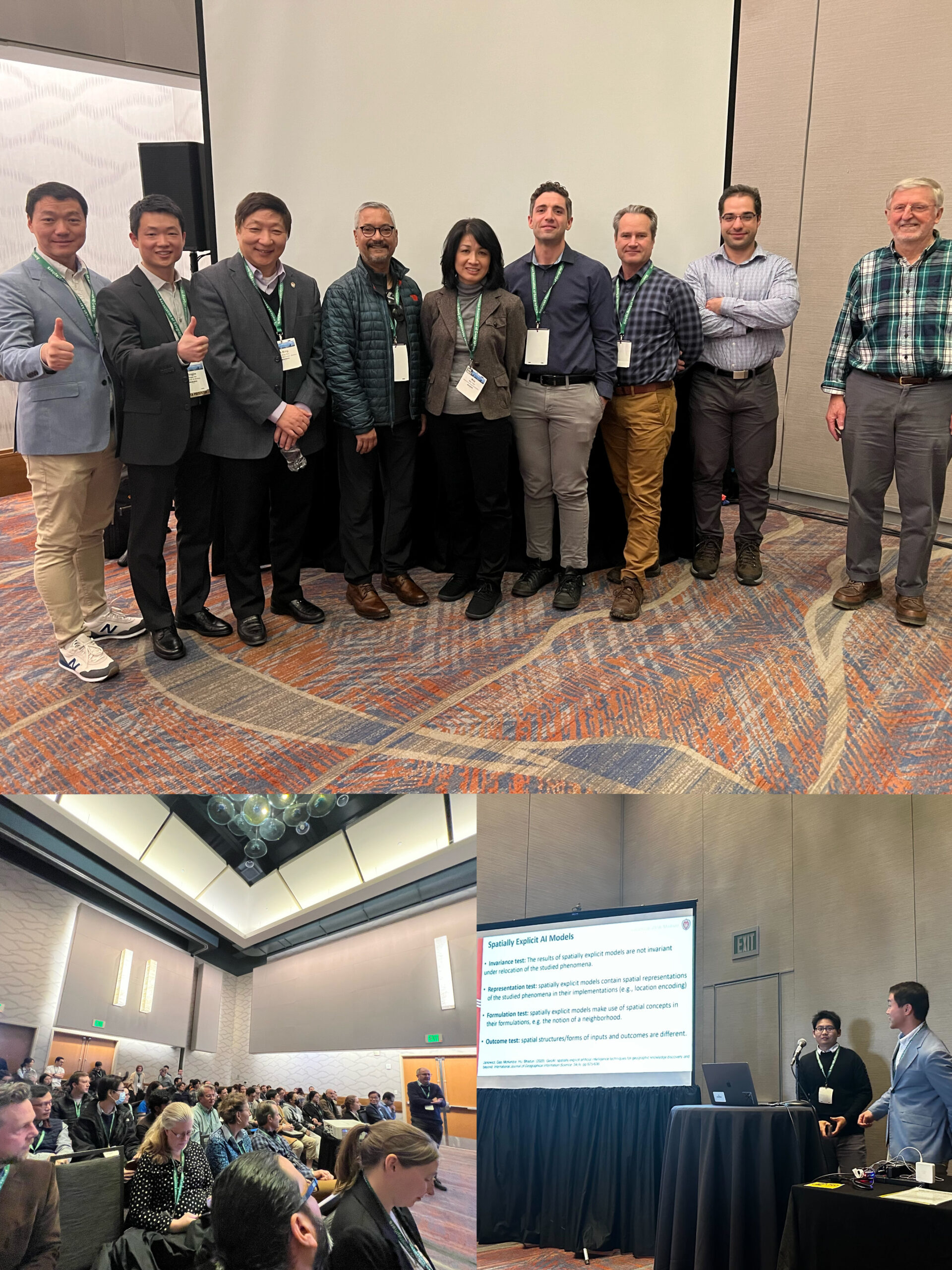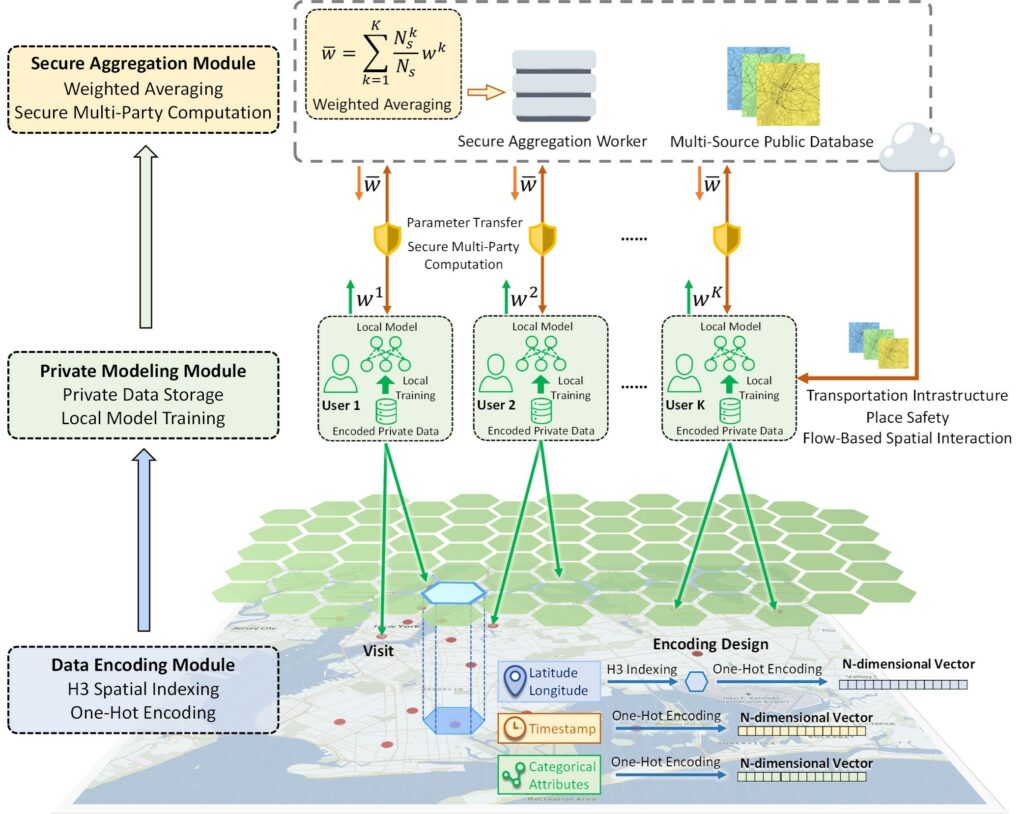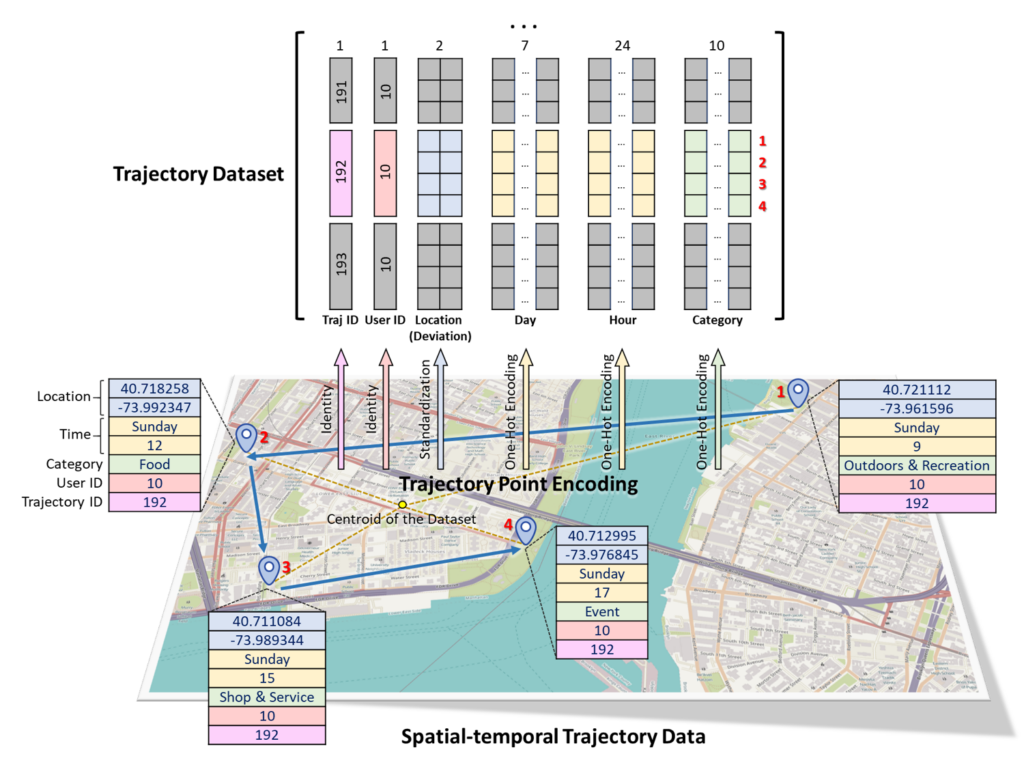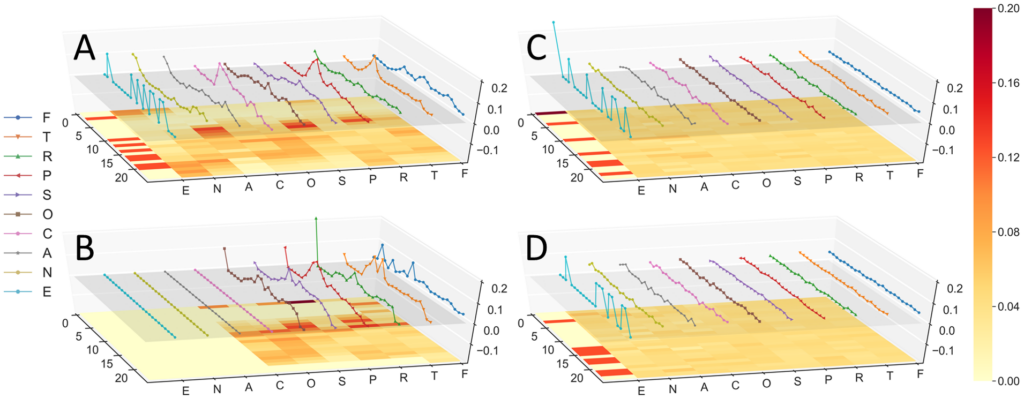Sessions at the 2023 AAG GeoAI Symposium (PDF download)

Symposium Lead Organizers:
Yingjie Hu, University at Buffalo
Song Gao, University of Wisconsin, Madison
Wenwen Li, Arizona State University
Dalton Lunga, Oak Ridge National Laboratory
Orhun Aydin, Saint Louis University
Shawn Newsam, University of California, Merced
3/23/2023, Thursday
GeoAI and Deep Learning Symposium: GeoAI for Feature Detection and Recognition
- Session link: https://aag.secure-platform.com/aag2023/solicitations/39/sessiongallery/5646
- Organizers: Sam Arundel, sarundel@usgs.gov, US Geological Survey; Co-organizer: Wenwen Li, Arizona State University
- Date: 3/23/2023 (Thursday)
- Time: 8:30 AM – 9:50 AM Mountain Time
- Room: Capitol Ballroom 3, Hyatt Regency, Fourth Floor
GeoAI and Deep Learning Symposium: Deploying AI for Geospatial Data and Remote Sensing: Advances, Challenges and Obstacles
- Session link: https://aag.secure-platform.com/aag2023/solicitations/39/sessiongallery/6343
- Organizers: Rafael Pires de Lima, rlima@colorado.edu, University of Colorado Boulder; Co-organizers: Morteza Karimzadeh, University of Colorado Boulder, Guofeng Cao, University of Colorado Boulder, Andong Ma, University of Colorado Boulder
- Date: 3/23/2023 (Thursday)
- Time: 10:20 AM – 11:40 AM Mountain Time
- Room: Capitol Ballroom 1, Hyatt Regency, Fourth Floor
GeoAI and Deep Learning Symposium: A 5-year Milestone: Advances and Limitations in GeoAI Research So Far
- Session Link: https://aag.secure-platform.com/aag2023/solicitations/39/sessiongallery/5663
- Organizers: Yingjie Hu, Song Gao, Wenwen Li, Dalton Lunga, Orhun Aydin, and Shawn Newsame
- Panelists: Michael Goodchild, University of California Santa Barbara, A-Xing Zhu, University of Wisconsin, Madison, May Yuan, University of Texas Dallas, Orhun Aydin, Saint Louis University, Budhendra Bhaduri, Oak Ridge National Laboratory)
- Date: 3/23/2023 (Thursday)
- Time: 12:50 PM – 2:10 PM Mountain Time
- Room: Capitol Ballroom 1, Hyatt Regency, Fourth Floor
GeoAI and Deep Learning Symposium: Emerging Geo-Data Applications in Human Mobility Analysis
- Session link: https://aag.secure-platform.com/aag2023/solicitations/39/sessiongallery/5491
- Organizers: Xiao Li, xiao.li@ouce.ox.ac.uk, University of Oxford; Co-organizers: Xiao Huang, University of Arkansas, Haowen Xu, Oak Ridge National Laboratory, Yuhao Kang, University of Wisconsin, Madison
- Date: 3/23/2023 (Thursday)
- Time: 2:40 PM – 4:00 PM Mountain Time
- Room: Capitol Ballroom 3, Hyatt Regency, Fourth Floor
GeoAI and Deep Learning Symposium: GeoAI for Cartography and Mapping
- Session link: https://aag.secure-platform.com/aag2023/solicitations/39/sessiongallery/5571
- Organizers: Yao-Yi Chiang, yaoyi@umn.edu, University of Minnesota-Twin Cities; Co-organizer: Jina Kim, University of Minnesota)
- Date: 3/23/2023 (Thursday)
- Time: 4:30 PM – 5:50 PM Mountain Time
- Room: Capitol Ballroom 3, Hyatt Regency, Fourth Floor
3/24/2023, Friday
GeoAI and Deep Learning Symposium: Spatial Data Science for Ecosystem Conservation and Biodiversity
- Session link: https://aag.secure-platform.com/aag2023/solicitations/39/sessiongallery/5671
- Organizers: Orhun Aydin, orhun.aydin@slu.edu, Saint Louis University; Somayeh Dodge, University of California Santa Barbara
- Date: 3/24/2023 (Friday)
- Time: 8:30 AM – 9:50 AM Mountain Time
- Room: Capitol Ballroom 3, Hyatt Regency, Fourth Floor
GeoAI and Deep Learning Symposium: Spatially Explicit Machine Learning and Artificial Intelligence I
- Session Link: https://aag.secure-platform.com/aag2023/solicitations/39/sessiongallery/5603
- Organizers: Gengchen Mai, gengchen.mai@gmail.com, University of Georgia; Co-organizers: Angela Yao, University of Georgia; Yao-Yi Chiang, University of Minnesota-Twin Cities; Zhangyu Wang, University of California Santa Barbara
- Date: 3/24/2023 (Friday)
- Time: 12:50 PM – 2:10 PM Mountain Time
- Room: Capitol Ballroom 3, Hyatt Regency, Fourth Floor
GeoAI and Deep Learning Symposium: Spatially Explicit Machine Learning and Artificial Intelligence II
- Session Link: https://aag.secure-platform.com/aag2023/solicitations/39/sessiongallery/6197
- Organizers: Gengchen Mai, gengchen.mai@gmail.com, University of Georgia; Co-organizers: Angela Yao, University of Georgia; Yao-Yi Chiang, University of Minnesota-Twin Cities; Zhangyu Wang, University of California Santa Barbara
- Date: 3/24/2023 (Friday)
- Time: 2:40 PM – 4:00 PM Mountain Time
- Room: Capitol Ballroom 3, Hyatt Regency, Fourth Floor
GeoAI and Deep Learning Symposium: Spatially Explicit Machine Learning and Artificial Intelligence III
- Session Link: https://aag.secure-platform.com/aag2023/solicitations/39/sessiongallery/6083
- Organizers: Gengchen Mai, gengchen.mai@gmail.com, University of Georgia; Co-organizers: Angela Yao, University of Georgia; Yao-Yi Chiang, University of Minnesota-Twin Cities; Zhangyu Wang, University of California Santa Barbara
- Date: 3/24/2023 (Friday)
- Time: 4:30 PM – 5:50 PM Mountain Time
- Room: Capitol Ballroom 5, Hyatt Regency, Fourth Floor
3/25/2023, Saturday
GeoAI and Deep Learning Symposium: Intelligent Geospatial Analytics
- Session link: https://aag.secure-platform.com/aag2023/solicitations/39/sessiongallery/5453
- Organizers: Di Zhu, dizhu@umn.edu, University of Minnesota; Co-organizer: Guofeng Cao, University of Colorado, Boulder; Song Gao, University of Wisconsin, Madison
- Date: 3/25/2023 (Saturday)
- Time: 8:30 AM – 9:50 AM Mountain Time
- Room: Capitol Ballroom 3, Hyatt Regency, Fourth Floor
GeoAI and Deep Learning Symposium: GeoAI for Disaster Resilience
- Session link: https://aag.secure-platform.com/aag2023/solicitations/39/sessiongallery/5539
- Organizers: Bing Zhou, spgbarrett@tamu.edu, Texas A&M University. Co-organizers: Lei Zou, Texas A&M University; Yingjie Hu, University at Buffalo; Marcela Suárez, Penn State University
- Date: 3/25/2023 (Saturday)
- Time: 10:20 AM – 11:40 AM Mountain Time
- Room: Capitol Ballroom 3, Hyatt Regency, Fourth Floor
3/26/2023, Sunday
GeoAI and Deep Learning Symposium: Urban Visual Intelligence
- Session link: https://aag.secure-platform.com/aag2023/solicitations/39/sessiongallery/5645
- Organizers: Yuhao Kang, yuhao.kang@wisc.edu, University of Wisconsin, Madison; Co-organizer: Fan Zhang, cefzhang@ust.hk, Hong Kong University of Science and Technology
- Date: 3/26/2023
- Time: 10:20 AM – 11:40 AM Mountain Time
- Room: Capitol Ballroom 3, Hyatt Regency, Fourth Floor
GeoAI and Deep Learning Symposium: Geoprivacy and Ethics in Geospatial Data and GeoAI
- Session link: https://aag.secure-platform.com/aag2023/solicitations/39/sessiongallery/5641
- Organizers: Hongyu Zhang, hongyu.zhang@mcgill.ca, McGill University; Co-organizers: Junghwan Kim, Virginia Tech; Majid Hojati, Wilfrid Laurier University; Jinmeng Rao, University of Wisconsin-Madison)
- Date: 3/26/2023 (Sunday)
- Time: 8:30 AM – 9:50 AM Mountain Time
- Room: Capitol Ballroom 3, Hyatt Regency, Fourth Floor
Program Committee:
Sean C. Ahearn, Hunter College — CUNY
Samantha T. Arundel, US Geological Survey
Orhun Aydin, Saint Louis University
Andrea Ballatore, King’s College London
Budhendra Bhaduri, Oak Ridge National Lab
Ling Bian, University at Buffalo
Kai Cao, East China Normal University
Guofeng Cao, University of Colorado, Boulder
Yao-Yi Chiang, University of Minnesota-Twin Cities
Somayeh Dodge, University of California Santa Barbara
Chen-Chieh Feng, National University of Singapore
Amy Frazier, Arizona State University
Michael F. Goodchild, University of California, Santa Barbara
Majid Hojati, Wilfrid Laurier University
Yingjie Hu, University at Buffalo
Xiao Huang, University of Arkansas
Qunying Huang, University of Wisconsin, Madison
Jamon Van Den Hoek, Oregon State University
Krzysztof Janowicz, University of Vienna & University of California, Santa Barbara
Chaogui Kang, China University of Geosciences
Yuhao Kang, University of Wisconsin, Madison
Carsten Keßler, Aalborg University Copenhagen
Morteza Karimzadeh, University of Colorado Boulder
Jina Kim, University of Minnesota
Junghwan Kim, Virginia Tech
Nina Lam, Louisiana State University
Xiaojiang Li, Temple University
Wenwen Li, Arizona State University
Xiao Li, University of Oxford
Yu Liu, Peking University, China
Tao Liu, Michigan Technological University
Grant McKenzie, McGill University
Antonio Medrano, Texas A&M University Corpus Christi
Gengchen Mai, University of Georgia
Yi Qiang, University of South Florida
Alex Sorokine, Oak Ridge National Lab
Avipsa Roy, University of California, Irvine
Kathleen Stewart, University of Maryland, College Park
Marcela Suárez, Penn State University
Wenwu Tang, University of North Carolina at Charlotte
Daoqin Tong, Arizona State University
Ming-Hsiang Tsou, San Diego State University
Mingshu Wang, University of Glasgow
Shaohua Wang, Chinese Academy of Sciences
Shaowen Wang, University of Illinois, Urbana-Champaign
Zhangyu Wang, University of California Santa Barbara
Dawn Wright, Esri Inc.
Hsiuhan (Lexie) Yang, Oak Ridge National Laboratory
Haowen Xu, Oak Ridge National Laboratory
Angela Yao, University of Georgia
Xinyue Ye, Texas A&M University
Eun-Hye Enki Yoo, University at Buffalo
Manzhu Yu, Penn State University
May Yuan, University of Texas at Dallas
Fan Zhang, Hong Kong University of Science and Technology
Hongyu Zhang, McGill University
Bo Zhao, University of Washington
A-Xing Zhu, University of Wisconsin, Madison
Di Zhu, University of Minnesota, Twin Cities
Lei Zou, Texas A&M University
This symposium is sponsored by: AAG GISS, CI and SAM specialty groups



